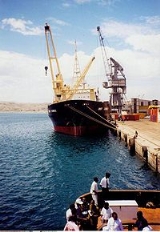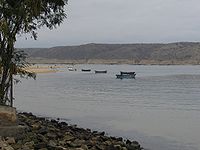
Lobito
Encyclopedia
Lobito is a town
and municipality
in Benguela Province in Angola
.
It dates from 1905 and owes its existence to the bay of the same name having been chosen as the sea terminus of the Benguela railway to the far interior, passing through Luau to Katanga
in the Democratic Republic of the Congo
. The city is located on the coast of the Atlantic Ocean
. The population is about 207,957 (2005).
) was created in 1843 by the Portuguese administration. The town was also founded in 1843 by order of Maria II of Portugal, and its harbour works were begun in 1903. Large developments, however, were not stimulated until the completion in 1928 of the important Benguela Railway, which connected Portuguese Angola with the Belgian Congo
. Under Portuguese rule, the port was one of Angola’s busiest, exporting agricultural
produce from the interior and handling transit trade from the mines of southeastern Belgian Congo and of Zambia. Fishing
, tourism and services were also important. The carnival
in Lobito was also one of the most renowned and popular in Portuguese Angola.
 After the April 25, 1974 Carnation Revolution
After the April 25, 1974 Carnation Revolution
in Lisbon
, Angola was offered independence. Lobito’s port activities were highly limited by disruptions to railway transit and high insecurity during the Angolan Civil War
(1975–2002). With peace and stability, in the 2000s the Lobito started a process of reconstruction and resumed its path to development.
Town
A town is a human settlement larger than a village but smaller than a city. The size a settlement must be in order to be called a "town" varies considerably in different parts of the world, so that, for example, many American "small towns" seem to British people to be no more than villages, while...
and municipality
Municipalities of Angola
The following is the list of municipalities of Angola, grouped by province.Angola contains 18 províncias which are divided into 163 municípios ....
in Benguela Province in Angola
Angola
Angola, officially the Republic of Angola , is a country in south-central Africa bordered by Namibia on the south, the Democratic Republic of the Congo on the north, and Zambia on the east; its west coast is on the Atlantic Ocean with Luanda as its capital city...
.
It dates from 1905 and owes its existence to the bay of the same name having been chosen as the sea terminus of the Benguela railway to the far interior, passing through Luau to Katanga
Katanga Province
Katanga Province is one of the provinces of the Democratic Republic of the Congo. Between 1971 and 1997, its official name was Shaba Province. Under the new constitution, the province was to be replaced by four smaller provinces by February 2009; this did not actually take place.Katanga's regional...
in the Democratic Republic of the Congo
Democratic Republic of the Congo
The Democratic Republic of the Congo is a state located in Central Africa. It is the second largest country in Africa by area and the eleventh largest in the world...
. The city is located on the coast of the Atlantic Ocean
Atlantic Ocean
The Atlantic Ocean is the second-largest of the world's oceanic divisions. With a total area of about , it covers approximately 20% of the Earth's surface and about 26% of its water surface area...
. The population is about 207,957 (2005).
Portuguese rule
Lobito, was built on a sandspit and reclaimed land, with one of Africa’s finest natural harbours, protected by a 5 km long sandspit. The old council (concelhoConcelho
Concelho , in the Portuguese language, is the word municipality, when referring to the territory. The word município is used when municipality means the organ of State...
) was created in 1843 by the Portuguese administration. The town was also founded in 1843 by order of Maria II of Portugal, and its harbour works were begun in 1903. Large developments, however, were not stimulated until the completion in 1928 of the important Benguela Railway, which connected Portuguese Angola with the Belgian Congo
Belgian Congo
The Belgian Congo was the formal title of present-day Democratic Republic of the Congo between King Leopold II's formal relinquishment of his personal control over the state to Belgium on 15 November 1908, and Congolese independence on 30 June 1960.-Congo Free State, 1884–1908:Until the latter...
. Under Portuguese rule, the port was one of Angola’s busiest, exporting agricultural
Agriculture in Angola
Agriculture in Angola has a tremendous potential. Angola is a potentially rich agricultural country, with fertile soils, a favourable climate, and about 57.4 million ha of agricultural land, including more than 5.0 million ha of arable land...
produce from the interior and handling transit trade from the mines of southeastern Belgian Congo and of Zambia. Fishing
Fishing in Angola
Fishing in Angola is mainly performed by foreign fleets. Some of the foreign fishing fleets operating in Angolan waters were required by the government to land a portion of their catch at Angolan ports to increase the local supply of fish...
, tourism and services were also important. The carnival
Carnival
Carnaval is a festive season which occurs immediately before Lent; the main events are usually during February. Carnaval typically involves a public celebration or parade combining some elements of a circus, mask and public street party...
in Lobito was also one of the most renowned and popular in Portuguese Angola.
After independence from Portugal

Carnation Revolution
The Carnation Revolution , also referred to as the 25 de Abril , was a military coup started on 25 April 1974, in Lisbon, Portugal, coupled with an unanticipated and extensive campaign of civil resistance...
in Lisbon
Lisbon
Lisbon is the capital city and largest city of Portugal with a population of 545,245 within its administrative limits on a land area of . The urban area of Lisbon extends beyond the administrative city limits with a population of 3 million on an area of , making it the 9th most populous urban...
, Angola was offered independence. Lobito’s port activities were highly limited by disruptions to railway transit and high insecurity during the Angolan Civil War
Angolan Civil War
The Angolan Civil War was a major civil conflict in the Southern African state of Angola, beginning in 1975 and continuing, with some interludes, until 2002. The war began immediately after Angola became independent from Portugal in November 1975. Prior to this, a decolonisation conflict had taken...
(1975–2002). With peace and stability, in the 2000s the Lobito started a process of reconstruction and resumed its path to development.

